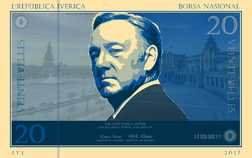Iverican Velle
| Velle | |
|---|---|
 2017 Commemorative Bill featuring Primo Franso Deitorr | |
| ISO 4217 | |
| Unit | |
| Plural | Velles |
| Symbol | Ꝟ |
| Nickname | Uve |
| Denominations | |
| Subunit | |
| 1/100 | Centavo |
| Plural | |
| Centavo | Centavos |
| Symbol | |
| Centavo | ¢ |
| Nickname | |
| Centavo | Se'ito |
| Demographics | |
| User(s) | |
| Issuance | |
| Central bank | Bank of Iverica, Republican Mint |
| Valuation | |
| Inflation | 1.6% (avg. Q4 2020) |
| Source | Q4 2020 |
The Iverican Velle (symbol: Ꝟ; ISO code: IVE), known in some contexts simply as the Velle, is the official currency of the Republic of Iverica and its overseas dependencies; Las Ultramares Islands and the Cussian Protectorate of Monarch Island. It is subdivided into 100 centavos. The Iverican Velle is the oldest Iberic currency still in circulation since the discontinuation of the Iberic Real in 1655 A.D.
The Velle is the sixth most-traded currency in the foreign exchange market, after the (currency). The Iverican Velle is the currency most used in transactions between the Argic-Alharun Iberic Diaspora and is the Association of Iberic Nations' foremost reserve currency, The Velle is backed by Iverica's value in science and technology, its military's security to enforce its economic rights, the full faith of the Iverican government to reimburse its debts, and its central role in a range of regional and international institutions since the Second Argic War. Argic-Alharun Iberic Diaspora countries are also known to use the Iverican Velle as an accepted currency.
The Iverican overseas autonomous region of Ultramares uses a similar currency, the Mariano Velle, which is considered fully equivalent to the Iverican Velle in their region. The Iverican Velle is also used in the Iverican overseas protectorate territory of New Beautancus. The Bank of Iverica is the central bank for the Iverican Velle, issuing its own banknotes, and regulating issuance of banknotes by private banks.
Etymology
The word Velle is an Ibericanisation of the Narvic word Vellæ, which can be directly translated to Vellum in modern Anglish. The Ivericans adopted the Narvic practice of using small cuts of calf-skin or sheep-skin notes as deeds and important documentation. Prior to the Iberic colonisation, such skins were only used for recording debts, loans, titles, deeds, or contracts. Common Narvic currency consisted mostly of metal coinage.
The word Velle eventually became synonymous with currency as the Ivericans adopted the use of strips of vellum for producing bank notes. This practice was short lived however, as by the close of the 17th century, papermakers from Esonice were imported for printing paper bank notes. Despite this, the word became entrenched in regular day-to-day use, finally becoming legitimised in the first colonial dictionary printed in 1702